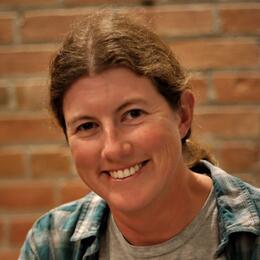In June, we’re featuring beach birds! We need YOU to help protect beach birds and their babies. Together, we can defend an important ecosystem that impacts many other animals, sea life and plants. Learn more about our month long celebration of beach birds and how YOU can help on our website!
This post is from our summer communication's intern Abby as part of her Abby’s Birdbrained Summer blogging series.
Marlene Eader is the Wrightsville Beach volunteer coordinator for Audubon North Carolina. This year, she oversees about 30 Beach Stewards who serve as ambassadors between the birds and beachgoers.
North Carolina Audubon's Beach Stewards are a band of amazing volunteers that sit near nesting areas on the south end of Wrightsville Beach to educate beachgoers and protect the birds from disturbance which jeopardizes eggs and chicks. This year, Audubon's volunteers range from beginning birdwatcher to expert birders. Each volunteer has been trained to identify birds, answer questions from curious beachgoers, and were even loaned a pair of binoculars for the summer. Come out and say "hi" through August. Learn about all Audubon's coastal volunteer opportunities here.
I joined her for a bird walk around the south-end nesting colony on a Friday morning. Anyone is welcome to join her at 9 a.m. at the gazebo of Beach Access #43 for the weekly walks. She only cancels when there is heavy rain.
Marlene actually started working with Audubon through the Friday morning bird walks she now leads. The first time she came to a bird walk, the Least Terns were starting courtship rituals. She loved the way the males enticed the females with baitfish, and returned each week throughout the season to watch the birds nest and their chicks hatch. She has been working with Audubon for four years now.
Marlene related this to me as she toted her large scope up the beach. She trained the lens on some Black Skimmers prone on the beach; the way they relax often makes a beginning birdwatcher fear the birds are dead. She pointed out Black Skimmer’s underbite, the yellow bills of the Least Terns, and an antenna protruding from an American Oystercatcher’s tail. The antenna transmits data to a satellite so the bird can be tracked. This bird is one of six Audubon is tracking.
A number of beachgoers joined us to view the birds, and I was surprised how many have talked with Marlene before.
A girl from Asheville named Eva was only staying for the week, but wanted to watch the birds every day. “I was just picking up shells and hanging out when I saw the scope!” Eva said.
While we were talking to Eva, I noticed a man trespassing in the colony. He was heading directly toward the oystercatcher’s nest. Marlene related that the stewards’ most important job is to protect the colony from human disturbances.
A dog on the beach or a human walking through the posting will cause a colony of birds to leave their nests to attack, or mob, the threat. On a hot summer day, this endangers the birds’ eggs and chicks. “It only takes ten minutes for the eggs to become nonviable,” Marlene said.
Going within the posting may carry a fine of $500, and citizens are encouraged to notify the Wrightsville Beach Police if they see a trespasser. Dogs are not allowed on Wrightsville Beach from April through September, and stewards give dog walkers a friendly reminder about the $250 fine. Marlene noted that most people do not have malicious intentions, but are unaware of the birds and their fragility. Stewards on the beach educate the community to maintain harmony between beachgoers and shorebirds.
Marlene is outside of the bird posting every day. Next time you're in the area, be sure to stop by and look through the scope! Standing outside the posting is like watching your own personal Animal Planet reality show. I saw different birds breed, nest, defend their eggs, and nurture their young all in the course of an hour. It is incredible to watch them mature through the entirety of the nesting season.
If you are interested in more information regarding the Wrightsville Beach Beach Stewards, contact Marlene at meader@audubon.org.




